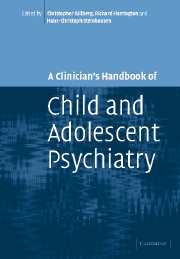Book contents
- Frontmatter
- Contents
- Preface
- List of contributors
- 1 Brain disorders
- 2 Substance use disorders
- 3 Schizophrenia and schizophrenia-like disorders
- 4 Affective disorders
- 5 Anxiety disorders
- 6 Obsessive-compulsive disorders
- 7 Adjustment disorders
- 8 Post-traumatic stress disorder
- 9 Functional somatic symptoms and somatoform disorders in children
- 10 Eating disorders: anorexia nervosa and bulimia nervosa
- 11 Sleep disorders
- 12 Personality disorders
- 13 Mental retardation/learning disability
- 14 Specific developmental disorders of speech and language
- 15 Reading and other learning disorders
- 16 Autism spectrum disorders
- 17 Hyperkinetic disorders
- 18 Conduct disorders
- 19 Elective mutism
- 20 Attachment and disorders of attachment
- 21 Tic disorders
- 22 Elimination disorders: enuresis and encopresis
- 23 Physical and sexual abuse
- 24 Gender identity disorders
- Index
- References
9 - Functional somatic symptoms and somatoform disorders in children
Published online by Cambridge University Press: 06 August 2009
- Frontmatter
- Contents
- Preface
- List of contributors
- 1 Brain disorders
- 2 Substance use disorders
- 3 Schizophrenia and schizophrenia-like disorders
- 4 Affective disorders
- 5 Anxiety disorders
- 6 Obsessive-compulsive disorders
- 7 Adjustment disorders
- 8 Post-traumatic stress disorder
- 9 Functional somatic symptoms and somatoform disorders in children
- 10 Eating disorders: anorexia nervosa and bulimia nervosa
- 11 Sleep disorders
- 12 Personality disorders
- 13 Mental retardation/learning disability
- 14 Specific developmental disorders of speech and language
- 15 Reading and other learning disorders
- 16 Autism spectrum disorders
- 17 Hyperkinetic disorders
- 18 Conduct disorders
- 19 Elective mutism
- 20 Attachment and disorders of attachment
- 21 Tic disorders
- 22 Elimination disorders: enuresis and encopresis
- 23 Physical and sexual abuse
- 24 Gender identity disorders
- Index
- References
Summary
Introduction
Somatoform disorders differ from other psychiatric disorders in two main respects: first through the fact that presenting complaints are physical as opposed to psychological in nature; secondly because parents and children usually attribute these symptoms to physical illness in spite of the lack of medical evidence, including examination and physical investigations. As a result somatoform disorder tends to present to psychiatrists only after repeated paediatric or other specialist investigations have taken place, and the referral may be accepted only reluctantly by a number of families who are sceptical about the usefulness of a psychiatric assessment, even sometimes hostile to this. This calls for special expertise at the child psychiatry clinic in assessment and management.
A crucial feature of somatoform disorders is the presence of somatization or the manifestation of distress through somatic symptoms, a tendency to experience and communicate somatic distress and symptoms unaccounted for by pathological findings, to attribute them to physical illness and to seek medical help. Functional or unexplained physical symptoms (ie those without an established organic substrate) are common in the general population but do not necessarily lead to impairment, nor are they always an expression of distress or linked to illness beliefs and medical help seeking. However, the associations of unexplained recurrent physical symptoms in the child and adolescent general population have a great deal in common with those of somatoform disorders, and unexplained physical symptoms will also be considered in this chapter alongside these disorders.
- Type
- Chapter
- Information
- A Clinician's Handbook of Child and Adolescent Psychiatry , pp. 246 - 271Publisher: Cambridge University PressPrint publication year: 2006
References
- 2
- Cited by



